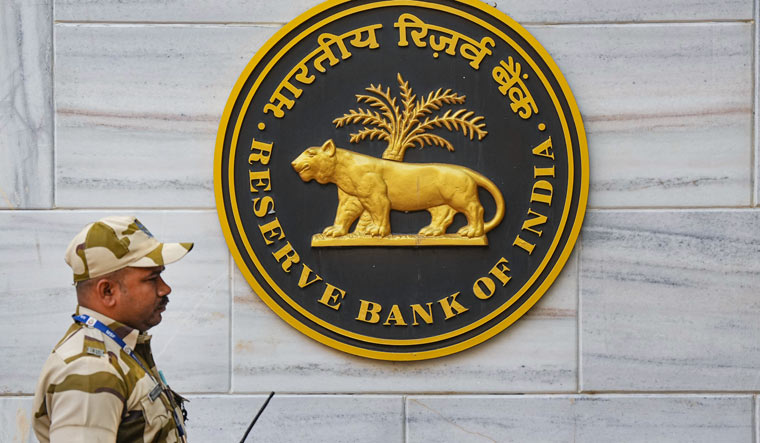The Reserve Bank of India Governor Shaktikanta Das has called on regulated financial entities to focus on improving governance standards and risk management practices, even as he reiterated that the overall banking system remained sound and resilient.
"It is important that the regulated entities should continue to improve their governance standards, risk management practices and compliance culture across the organisation," he said in his statement after the meeting of the monetary policy committee on Friday.
His statement comes in the backdrop of action taken by the central bank on several financial entities over the last year for failing to comply with regulatory norms and or other deficiencies.
Earlier this year, the Reserve Bank had restricted Paytm Payments Bank from accepting deposits or top-ups in wallet, FASTags among other instruments, citing persistent non-compliances and continued material supervisory concerns in the bank.
ALSO READ: What prompted RBI to keep repo rate unchanged for eighth time in a row
More recently, Kotak Mahindra Bank was barred from onboarding new customers on its online and banking channels and issuing fresh credit cards; the actions were based on significant concerns arising out of the Reserve Bank’s IT Examination of the bank for the years 2022 and 2023.
The central bank had also acted against a few other non-banking finance companies like IIFL Finance (clampdown on its gold loan business) and JM Financial Products (it was prohibited from financing against shares, debentures etc).
Das, however, stressed that there were only outlier cases where action had to be taken and there was no large-scale issue. For instance, he pointed out that there were 9,500 NBFCs and supervisory actions had been taken only in case of three entities. It was a similar case with banks.
"It is not as if there is a large-scale deficiency in the system. Where ever, we see a deficiency, we engage with the entity to see that necessary corrective measures are taken," he said in an interaction with reporters later.
Das, on Friday, also highlighted that a few registered entities were still charging fees etc. that were not specified or disclosed in the key facts statement. It has also been observed in some micro-finance institutions and NBFCs that the interest rates on small-value loans are high and appear to be usurious, said Das.
"The regulatory freedom enjoyed by the regulated entities in respect of interest rates and charges should be used judiciously to ensure fair and transparent pricing of products and services," said Das.
He stated that customer protection remained on top of the Reserve Bank’s priorities.
READ MORE: RBI keeps repo rate unchanged at 6.5 pc; raises growth projection to 7.2 pc
Last year, the RBI had flagged certain concerns on excessive growth in unsecured retail loans and over-reliance of non-banking finance companies on bank funding. Recent data suggested that there had been some moderation in these loans and advances, Das said on Friday, adding that they would continue to monitor incoming data to ascertain if further measures were necessary.
"The boards and top management of regulated entities should ensure that risk limits and exposures for each line of business are kept well within their respective risk appetite framework."
The RBI has also driven attention to the persistent gap between credit and deposit growth rates and said it warranted a rethink by bank boards to re-strategise their business plans.
"Essentially, it is our intention to flag any possible build-up of risk. Potential areas of concern is what we keep looking for. And then it is our intention to communicate them to the regulated entities. We have requested the boards to relook and re-strategise their business plans taking into account the widening gap in the growth in deposits and growth in their loan book. It is left to the individual entities basis their business plans and if it is required they will have to modify their business plans to suit a long-term sustainability," said RBI deputy governor Swaminathan Janakiraman.
In the past, several banks have reported issues related to outages in net banking, UPI payments etc. Swaminathan pointed out that such system outages were also being closely monitored by the central bank.
"We have a portal in which all the regulated entities are required to report their outages both planned and unplanned. At the system level we are seeing the trend, which is encouraging. However, if there are any outlier entities, on a bilateral basis we talk to them and we also issue them a corrective action plan to augment their infrastructure proportionate to the growth in business levels," he said.
Digital payments intelligence platform planned
Meanwhile, the central bank has plans to set up a digital payments intelligence platform, which will harness advanced technologies to mitigate payment fraud risks.
Many frauds occur by influencing unsuspecting victims to make the payment or share credentials. While the payment ecosystem, including banks, payment apps and the National Payments Corporation of India (NPCI) take various measures on an ongoing basis to protect customers from such frauds, there is a need for network-level intelligence and real-time data sharing across payment systems, the central bank said.
The RBI has constituted a committee, which will be chaired by A.P. Hota, former MD & CEO of NPCI, to examine various aspects of setting up a digital public infrastructure for digital payments intelligence platform. The committee is expected to give its recommendations in two months.



